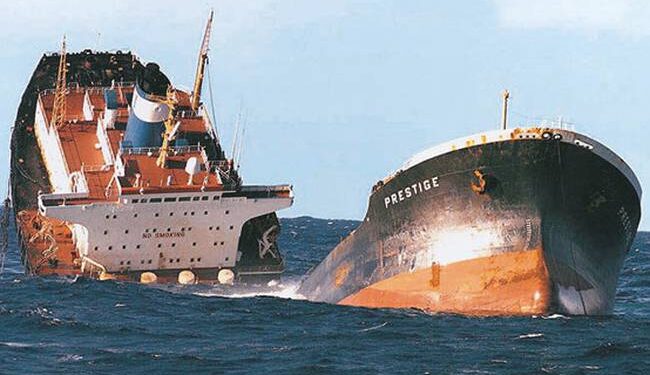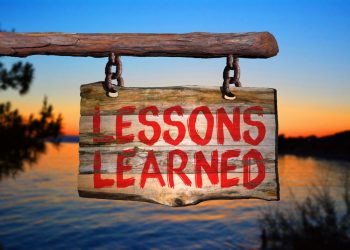In 2002, the Greek-owned and Bahamas-operated tanker ‘Prestige’ encountered heavy weather during a routine voyage and eventually sank off the coast of Spain, causing the worst environmental disaster in the country and one of the greatest oil spills in Europe.
The incident
On 13 November 2002, the Prestige was en route from Ventspils, Latvia to Gibraltar, carrying 77,000 metric tons of two different grades of heavy fuel oil, when it encountered inclement weather off Costa de la Muerte, in Galicia, northwestern Spain, and started to take on water from high waves, which caused a 50-foot hole on the starboard side. The Filipino crew was evacuated with rescue helicopters and the ship drifted within four miles of the Spanish coast already leaking oil.
As French, Spanish and Portuguese governments constantly refused to allow the ship to dock, in order to avoid pollution of their coastlines, and after several days of sailing adrift, the vessel split in half on 19 November in Portuguese waters. It eventually sank only about 250 kilometers from the Spanish coast, releasing over 17 million US gallons (76,000 m3) of oil into the water. As the oil leak continued after the sinking, 20 million US gallons (76,000 m3) of oil were spilled in total.
[smlsubform prepend=”GET THE SAFETY4SEA IN YOUR INBOX!” showname=false emailtxt=”” emailholder=”Enter your email address” showsubmit=true submittxt=”Submit” jsthanks=false thankyou=”Thank you for subscribing to our mailing list”]
Environmental consequences
Although there was no loss of life, the significance of the Prestige casualty is attributed to the magnitude of the resulted pollution of the Spanish and French coasts. The Prestige oil spill remains Spain’s and Portugal’s worst ecological disaster until today, causing significant damage to wildlife, environment, as well as the local fishing industry.
Photographs of the vessel taken on the 14th of November, after the ship had been taken in tow, clearly show oil escaping from the hull in the region of the starboard manifold.
After the sinking, the wreck continued to leak approximately 125 tons of oil a day, polluting the seabed and contaminating the coastline, especially along the territory of Galicia.
The environmental damage was most severe on the coast of Galicia. The affected area is an important ecological region, supporting coral reefs and many species of sharks and birds, and the fishing industry. Pictures of fishermen, using their own hands to pick up fuel oil, made their way around the world.
Probable cause
The official report by the Bahamas Maritime Authority stated that the probable cause of the initial breach in the hull was a large wave revealing a weakness in 3 Starboard wing tank. This weakness was probably a combination of two or more of the following:
- ship-to-ship transfer damage sustained at St. Petersburg where the ship underwent storage operations;
- fatigue;
- stresses due to large quantities of new metal being attached to old steelwork; and/or
- corrosion
Investigation has concluded that there was a leakage into 3 Starboard wing tank and 2 Starboard after wing tank, which were both originally empty, causing the starboard list. There is additional evidence that the side shell plating above the waterline in way of 3 Starboard wing tank was deformed and that the deck was set down, this being consistent with the observed damage to the starboard side hose rail and the drip tray.
Liabilities
The immediate legal consequence of the disaster was the arrest of the captain, who was convicted of recklessness resulting in catastrophic environmental damage and was sentenced to two years in prison by Spain’s Supreme Court in January 2016.
The decision was condemned by the industry, while the precedent Galician Provincial Court judgment had found the Captain innocent as he had fulfilled his professional duty in attempting to save his ship.
Confronted with a refusal by the Spanish authorities to give the damaged ship a place of refuge (where an oil spill could have been contained), not only the Master but also the Chief Engineer and the Chief Officer remained on board the vessel, whilst the risk of capsize was dramatically increasing,
…BMA underlines in the official report.
They had spent the time trying their best to help save their ship and cooperating with the shore authorities, despite believing that many of the decisions being taken by the shore authorities were wrong…Looking at the charge of causing pollution, it is difficult to blame the Master for the initial damage to his ship.
In November 2017, the Spanish court ordered the regional government of Galicia, off whose coast the Prestige tanker sank, to be compensated 1.8 million euros and neighbouring France, which was affected as well, 61 million euros. Also, the court said the ship’s insurers to pay one billion dollars which is the maximum limit fixed by the company in its contract for the ship.
Lessons learned
BMA report highlights that, during the Annual Survey of the ship six months before the incident, an internal survey should have been carried out because it was classed as a ballast tank and was adjacent to cargo tanks fitted with a means of heating. This was not done because the surveyor was not aware that a means of heating was fitted in the adjacent tanks. However, the tank in which the incident originated, 3 Starboard wing tank, was classed as a cargo tank for survey purposes and therefore was not due for inspection.
Given the above conclusions, there is a need to consider carefully current repair and survey practices to try to identify ways in which presently hidden sources of weakness can be revealed.
….BMA noted.
Another special area of focus should be given on the aspect of response. Experts on the aftermath of the accident noted that the overall reaction from the Spanish government was too slow and that a biggest focus was given on guilt rather than actual response. During the first days, the governments of both Spain and Portugal argued over who was responsible for cleaning up the spill, before the actual sinking. Consequently, more time was spent figuring out how not to get involved in the crisis than in trying to find a faster solution.
In crisis situations, the hard part is facing up to them. The problem doesn’t lie in the technical part of communicating but in the psychology of facing up to a crisis when you are responsible,
…emphasized at that time Antonio Cobelo, vice-rector of academic planning at the Universidad Antonio de Nebrija.
Notable is that when the Master asked to be taken to a place of refuge and was refused by Spanish authorities to do so, ‘the ship was close to the coast, there was only a limited breach in any of the cargo tanks, the leakage from the Butterworth openings had ceased, the ship was only listing about 5o and was under tow, and the main engine would have been available for manoeuvring’.
The provision of a place of refuge could well have resulted in a much more favourable outcome and prevented the subsequent large scale pollution of a long stretch of coastline.
Ironically January 2016 saw the launch of Europe’s new guidelines on places of refuge (PoR), developed jointly with the shipping industry and with the specific aim of resolving the issues surrounding the granting of a PoR. The proper implementation of these guidelines is intended to avoid repeating mistakes made during the Prestige and MSC Flaminia incidents.










































































































